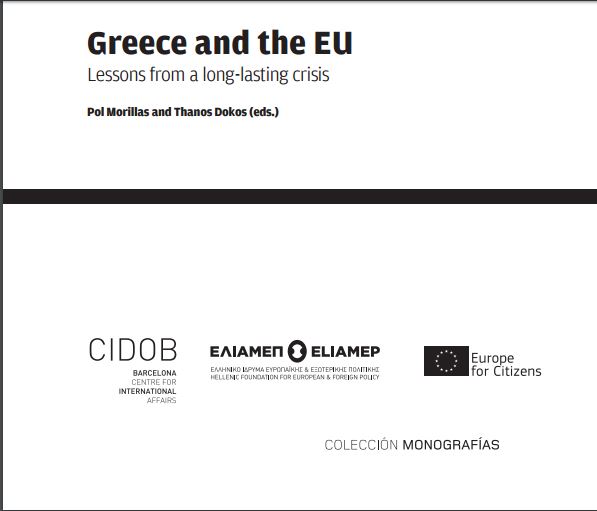Pol Morillas, Thanos Dokos, (2016), “Greece and the EU. Lessons from a Long-lasting Crisis”, CIDOB Monographs, Μάϊος Less than a year ago, the Greek crisis reached its highest level of tension. After arduous negotiations, the Greek government and its creditors signed the agreement for a third bailout in July 2015,which should provide liquidity to the Greek public sector in return for a severe programme of deficit adjustment and structural reforms. At …Read More
Political budget cycles and reelection prospects in Greece’s municipalities
Chortareas, Georgios, Logothetis, Vasileios, Papandreou, Andreas A., (2016), “Political budget cycles and reelection prospects in Greece’s municipalities”, European Journal of Political Economy, Μάιος This paper considers the presence of political budget cycles in Greece’s municipalities. We construct a new dataset from primary sources and we find strong evidence of pre-electoral manipulation through increased expenditures and excessive borrowing. We use a dynamic panel data approach producing evidence of opportunistic behavior in local government …Read More
The Greek Tragedy And Its Solution
Bernegger,Michael, (2016), “The Greek Tragedy And Its Solution”, Social Europe OP 8, Ιούνιος 2015 Ostensibly, the Greek crisis is about sovereign debt. It appears to result from a too expansionary fiscal policy and a loss in price competitiveness since the launch of the euro. This competitive weakness, it is claimed, can be attributed to an excessive rise in labour costs in relation to anaemic macroeconomic productivity growth. In reality, the …Read More
How to Handle the Crisis in Greece? Empirical Evidence Based on a Survey of Economics Experts
Potrafke,Niklas, Reischmann, Markus (2016), “How to Handle the Crisis in Greece? Empirical Evidence Based on a Survey of Economics Experts”, CESifo Working Paper No. 5860, Απρίλιος 2016 We asked experts from 113 countries polled by the CESifo World Economic Survey for their opinions on how to handle the crisis in Greece. 61.9% of the experts surveyed were not in favour of Greece exiting the Eurozone in the course of the negotiations held …Read More
An ever More Polarized Union: The Greek Problem and the Failure of EU Economic Governance
Notermans, Ton, (2016), “An ever More Polarized Union: The Greek Problem and the Failure of EU Economic Governance”, CESpapers – open forum #24 As the Greek economy continues on its downward trajectory, the policy debate has degenerated into a re-enactment of the neoclassics versus Keynesians controversy. Yet, the Greek crisis can be solved neither by more austerity and structural reforms nor by Keynesian reflation. The core problem lies in a form …Read More
Reform of Public Administration in Greece; Evaluating Structural Reform of Central Government Departments in Greece: Application of the DEA Methodology
Makrydemetres, Anthony, Zervopoulos, Panagiotis, D., Pravita, Maria-Eliana, (2016), “Reform of Public Administration in Greece; Evaluating Structural Reform of Central Government Departments in Greece: Application of the DEA Methodology”, GreeSE Paper No.97, Φεβρουάριος The focus of this study is the evaluation of the efficiency and effectiveness of Central Government Departments (CGDs) in Greece. Measurements are compared with those defined by the Administrative Reform 2013 (AR2013) to assess whether the reforms introduced by the …Read More
Financial assistance to Greece: Three programmes
Colasanti, Fabio, (2016), “Financial assistance to Greece: Three programmes”, European Policy Centre, 26 Φεβρουαρίου. There are a lot of myths surrounding the bailout money that was given to Greece. Many people still believe that the money never went to the Greek people, but to the Greek and European banks; that the intervention of the euro-area governments and the IMF dealt almost exclusively with the Greek debt; that very little money was used …Read More
Clientelism and economic policy: hybrid characteristics of collective action in Greece
Trantidis, Aris, (2015), Clientelism and economic policy: hybrid characteristics of collective action in Greece, Journal of European Public Policy, 11 Νοεμβρίου How does clientelism affect policy-making? Can patrons in government discard groups of clients in order to pursue reforms in conditions of crisis? The article argues that clientelism goes beyond the exchange of votes and may permeate organizations with the capacity for collective action such as labour unions. This merger gives rise …Read More
Poul Thomsen, Greece And IMF Cynicism
Munevar, Daniel, (2016), “Poul Thomsen, Greece And IMF Cynicism”, Social Europe Journal, 16 Φεβρουαρίου For the casual reader, Poul Thomsen’s recent piece on the role of the IMF in the bailout review negotiations taking place between Greece and the Troika would seem balanced and reasonable. At the end of the day, as he has argued elsewhere, the numbers simply need to add up. For that, there is a trade-off between …Read More
Greece: Toward a Workable Program
Thomsen, Poul M., (2016), “Greece: Toward a Workable Program”, Blog iMFdirect, 11 Φεβρουαρίου. Having successfully pulled Greece from the brink last summer and subsequently stabilized the economy, the government of Alexis Tsipras is now discussing with its European partners and the IMF a comprehensive multi-year program that can secure a lasting recovery and make debt sustainable. While discussions continue, there have been some misperceptions about the International Monetary Fund’s views and role in …Read More





